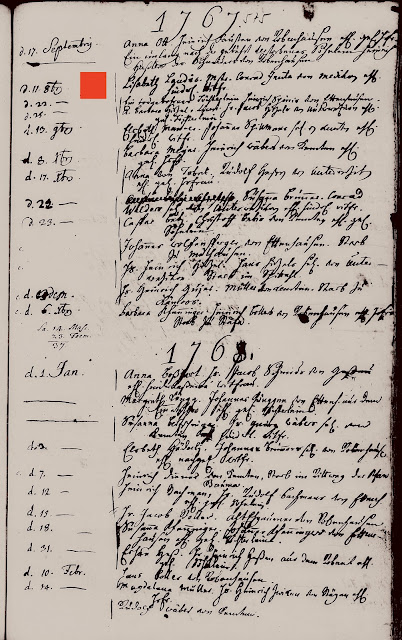Conrad Jenta married Lisabeth Landis 11 December 1732. She was from Wengi, near Aegust am Albis near Affoltern am Albis, Canton of Zurich. The church was built in 1667, after the Reformation and during the Renaissance and is five miles from Ottenbach where Suzanna Jenta and Johannes Sidler lived.
One of the interesting things about Elisabeth is that her husband, Conrad Jenta, and her father Caspar Landis were both tanners. Her father was a red tanner and her husband was just a tanner.
Susanna Jenta later come back to the same area and married Johannes Sidler. Most people in the 18th and 19 centuries married people from their community. Not Conrad and Elisabeth. From Schmidmüllen, Germany (not confirmed) to Aeugst am Albis is 321 miles which is a long way back then when people traveled by walking or riding horses. How they met is a mystery. Lisabeth married Conrad Jenta on 11 December 1732, in Aeugst am Albis, Zürich, Switzerland. They were the parents of at least 1 son and 2 daughters.
Spelling of Lisabeth: On her birth record it says Elisabeth, but on her marriage and death records it says Lisabeth. Either the Pastors made a mistake or she may have changed the spelling as she got older.
Documents related to Lisabeth Landis:
 |
| 1709 baptism Elisabeth Landis 14 November Aeugst Zürich Caspar Landis and Elisabeth Stünzi parents film 008125657 page 31 |
Translation by Wolf:
Name: Elisabeth / 9bris den 14. (Friday / 1709) = 14.11.1709
Parents: Meister Caspar Landis, Gerber / Elisabeth Stünzin
Godparents: Jacob Uster von Zollikon / Elsbeth Streulin von Käpffne
The parents got married on 20.04.1704 in Horgen ZH.
Spelling: Note the "….n" ending for female persons - this is added to the basic surname to indicate the sex. So the basic surnames here are Stünzi and Streuli respectively.
Kent: in German research they add "in" to female surnames. Wolf: Same in German speaking Switzerland - but … in this case they only added an "n" as both names already end with an "i", no second "i" is added.
Note: Variations in given names are quite frequent - different spellings like Elisabetha, Elisabeth, Elsbeth, Lisabeth, Lisbeth, … should be noted (could be helpful occasionally) but shouldn't be considered an indication for different individuals or mistakes by the writer.
 |
1732 marriage Conrad Jenta and Lisabeth Landis 11th Dec Evangelisch-Reformierte Kirche Aeugst (Zürich) film 008125657 page 294 |
des gleichen (= 11.12.1732)
H(ans) Conrad Janther(?) proselyt Gerwer von Schmidtmüll der oberen Pfalz u(nd) Lisabethta Landis Gerbers auß d(er) Wengi.
DeepL: H(ans) Conrad Janther(?) proselyt Gerwer von Schmidtmüll der oberen Pfalz u(nd) Lisabethta Landis Gerbers auß d(er) Wengi.
Note: The spelling Janther is not very clear - note that on https://suche.staatsarchiv.djiktzh.ch/detail.aspx?ID=4343584 "Jentha" is assumed - but knowing that his name in Germany was most likely spelled Jander I consider Janther a more likely alternative.
Wengi will most likely be Wängi/Wängibad, a hamlet near Aeugst am Albis.
Wolf: "ehelich" means the child was born to a married couple (Ehe = marriage). No special significance here - "ehelich" in many regions is always added to make sure the child is not "unehelich".
Note: The spelling Janther is not very clear - note that on https://suche.staatsarchiv.djiktzh.ch/detail.aspx?ID=4343584 "Jentha" is assumed - but knowing that his name in Germany was most likely spelled Jander I consider Janther a more likely alternative.
Wengi will most likely be Wängi/Wängibad, a hamlet near Aeugst am Albis.
Kent note: Seeing as most of the information including Conrad's place of birth, profession, place of the wedding and the name of his wife is correct. I believe we have the right couple even though the spelling of Conrad's last name is a bit off. Pastors are human and made mistakes. Sometimes they depended on their memories for spelling of names. In any case, everything fits except the spelling of Jenta.
Wolf: These are not mistakes. In order to be a mistake, there would have to be a fixed "correct" spelling - which didn't exist. Considering that the spelling in Germany was Jander/Jänder, there is only a small step to Janther or Jenther … and Jenta came in later in Wetzikon. Never forget: name spellings just changed with time - a natural development, no mistakes.
Translation by Wolf:
 |
1767 Lisabeth Landis Oct 11th burial Wetzikon film 008480741 page 288 |
den 11. 8bris (1767)
Lisabeth Landis Meister Conrad Jenta von Medikon ehelich hinderlassene Witfrau.
Lisabeth Landis Meister Conrad Jenta von Medikon ehelich hinderlassene Witfrau.
So Lisabeth was Conrad's widow.
DeepL: Lisabeth Landis Master Conrad Jenta von Medikon legitimate widow.
